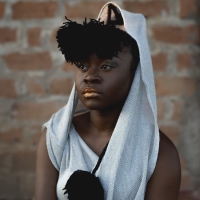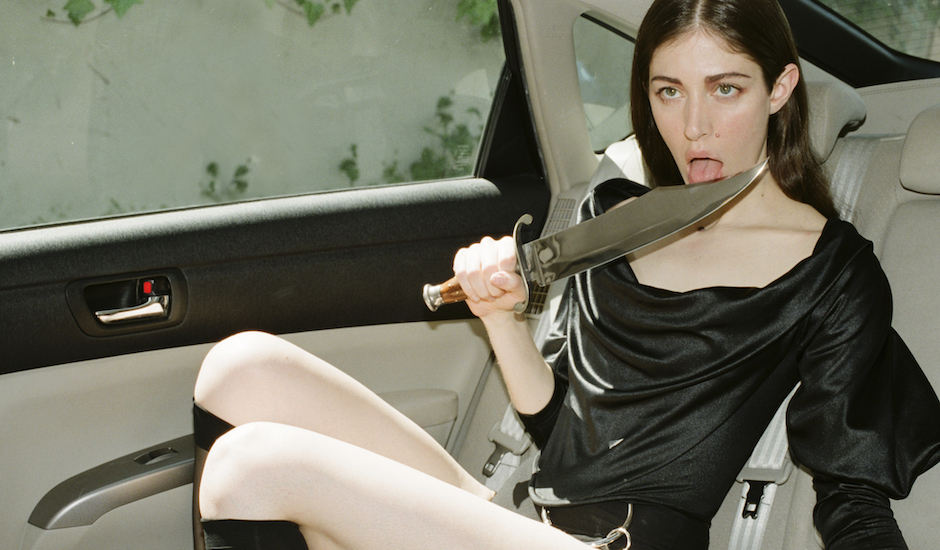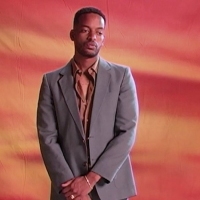 Storytelling with Sampa The Great: "I'm going to show you who I am."On her debut album The Return, the Zambian musician sets her narrative straight - with some of the year’s best music.
Storytelling with Sampa The Great: "I'm going to show you who I am."On her debut album The Return, the Zambian musician sets her narrative straight - with some of the year’s best music.

Searching for clarity and climate justice with Caroline Polachek
On Pang, Caroline’s first solo album under her own name, the former Chairlift member attempts to feed a hunger.
Header image by Nedda Asfari.
In the fourteen years since Chairlift’s inception, Caroline Polachek’s music has shifted between many forms.
Chairlift, the cult-adored indie-pop band she formed with Aaron Pfenning in 2005 (which gained a member - Patrick Wimberly - in 2007, before Pfenning left in 2010), is prized for its once-ability to stay ahead of a constantly moving Brooklyn-indie curve, while two of her side-projects since - Ramona Lisa and CEP - welcomed her experimentation into fantasy-like electronica and ambient synth soundscapes respectively. In a songwriting and production role, she’s worked alongside Charli XCX and Blood Orange - for starters - while her touch on Beyoncé’s No Angel found Polachek a GRAMMY Award nominee, after the album it was packaged on was nominated for Album Of The Year.
In a way, Polachek’s constant evolutionary drive within indie, pop and electronica - as well as their many intersections - is unlike that of many other musicians in the commercial public sphere. In 2018, she re-arranged a traditional Polish lullaby into the haunting, piano-twinkling Marzipan alongside PC Music experimentalist felicita, while her work in soundtracking fashion shows and ballets often have her creating cinematic soundscapes that teeter on the edge of aural universes. It makes sense then, for her entrance into the pop canon under her own name be one of the year’s most exciting spectacles - and that, it is.
Pang, arriving last Friday, is a 14-track exploration into Polachek’s many pockets of brilliance, filled with a sense of longing - or hunger, as she sometimes refers to it - that’s capable of bridging twinkling ballads and craftful, upbeat pop together. It’s authentically Caroline Polachek: the name is hers; the raw emotion it contains is hers (“I'm definitely getting into aspects with my personal life that I probably wouldn't have dared to get into before,” she told MTV News); and almost every sound brought to life across the album is hers, having performed, written and produced the entire album with a small, close-knit collection of collaborators.
Initially concepted as a peaceful, folk-tinged record titled Calico, Pang’s final form is far more daring and bold, worked on alongside PC Music producer Danny L Harle - someone who has taken Carly Rae Jepsen and Clairo into the depths of bold electronic experimentation in the past. On the album’s title track, shouts of “Pang!” litter twinkling melodies and shimmering beauty that quickly comes to define the album’s movements, whether it be swelling synths of Hit Me Where It Hurts or on the guitar-intertwined ballad Look At Me Now - a song in which Polachek’s vocal glitches with a seemingly autotune twist that takes the song into the future without it being about the future itself.
These examples, all taken from the album’s first half, host themes that involve Caroline Polachek unravelling, coming to terms with “losing control” that in the second half, rectifies it: the doubt, self-questioning and confusion falling away as she “makes sense of it” and rediscovers trust. On Hit Me Where It Hurts, she’s feeling trapped as something outside of her control moves her around (“I'm feeling like a butterfly trapped inside a plane / Maybe there's something going on, I'm not insane,” she sings), while on I Give Up, Polachek seemingly hits rock bottom: “I give up on you now,” she sings, “How far can you fall when you're already down?”
After Ocean of Tears introduces brightness and a sense of uplifting (“Show me the future, I'm all eyes,” she sings), the album moves into catharsis; Polachek’s reconciliation with trust soundtracked through some of the album’s best moments. On Hey Big Eyes, a sense of euphoria arrives as she sings on someone new entering your life, while the album’s final stretch of four songs - Caroline Shut Up, So Hot You’re Hurting My Feelings, Door and Parachute - are musical high peaks, encompassing Polachek’s experimentalism in pop music whether it be through the groove-filled hooks that backbone So Hot You’re Hurting My Feelings (which is about “a spicy, long-distance crush,” she says) or Door’s twisted longing (“Back in the city I'm just another girl in a sweater / Back in the city everything's different when we're not together,” her voice aches).
Parachute, despite being the album’s conclusion, was actually Pang’s first written. Created after deciding to cancel a writing session with Danny L Harle for Katy Perry’s record (they instead wrote music for Polachek herself), Parachute is a blossoming moment that triggered the boldness of Pang’s futuristic demeanour, and comes with the record’s most opening moment. “[Parachute] is about a total loss of control,” she told The Guardian. “And it’s not giving that control up to another person, it’s giving it up to life – and that’s the scariest thing.”
Here, speaking over the phone ahead of Pang’s release, we talk to Caroline Polachek about existing alongside the record, climate justice, and the musical ‘pang’ that defines the record’s many sounds:

To start this off, I wanted to talk about what would come to be the beginning of this record as it stands, which is when you wrote Parachute with Danny L Harle. What drew you to him as the collaborator to start building this world?
It was really the results that we got. I never would've thought that Dan was the person that I'd make this record with, because I had a kinda folk writing approach in mind when I started working on this record and despite our mutual backgrounds in classical music, Danny makes very forward-thinking and fucked dance music. It came as a big surprise really.
When we wrote Parachute, we were quite taken aback by it and how emotional it was, but also very futuristic without being a kind of statement about technology. I think that's one of the really amusing things about working with Dan: our work together does somehow feel futuristic, but without ever being about technology.
At what point into writing the album did the decision come to package it into an album under your own name?
I'd known even before Chairlift had even finished our last album that I'd next be working under my own name and I have spent a lot of time actually thinking about what I wanted to do with it. But, you know, as one of the most amazing things about music, so much of what ended up happening was a total surprise.
In the past, I've looked at every project as having a set of artistic and aesthetic parameters: Chairlift was an indie band, and I had a couple of side projects that were concept projects, both with a palette and an ethos built into them. I felt that in around late-2016, I knew I was ready to start working in a more open-ended way without forcing limitations onto a project. Working under my own name was the best way to do that.
When it comes to releasing music under your own name, does it feel different to releasing music as Chairlift, Ramona Lisa or CEP?
Of course. I've worked on this record than longer than I've ever worked on anything before, and I've also put so much more of myself into it - whether it be my own life experiences or my raw emotions in the vocals.
The music industry has changed so much, so many of the gatekeepers have disappeared or have been worked around - social media dominates the way that musicians are able to communicate with their fanbases now, and I think it's really exciting. I feel way more direct connection to my listeners than I ever felt before. Maybe that comes with the rawness of working under my own name, but I think a lot of just has to do with the landscape and how much it's changed. It's exciting.
That ties into something I was reading earlier, where you mentioned that you don't feel nervous about releasing the record, but more-so that you're feeling nervous about existing as a person alongside it all. Is that something new you're having to navigate with social media and having yourself out there this album cycle?
Yeah. It's so perplexing because I think what comes naturally to me, is that I really like to design things and tweak things and I really like to create environments. I don't really think about how myself as a body will always exist in that and as soon as a live show is on the calendar, it's something that you have to reconcile it. It's felt quite surreal to be like "alright, what am I going to wear on stage?".
How do you go about navigating something like that? Because when Chairlift would've first started, something like how you would've had to conduct yourself on Twitter, for example, wouldn't have been a worry - because it totally wasn't a thing.
Honestly, once the music started coming out it was fine. I took about two or three years off Twitter between records, and many of the things about it just came really naturally, because it's like a conversation: people ask questions, and then you have an answer for them. The thing that's more difficult for me and that I want to get better at is actually being able to speak about different kind of political things.
I follow a lot of writers, thinkers and experts - especially in climate science - and I think so many people right now feel really strongly about the subject of climate justice, and yet at the same time, I feel like I'm not able to be a legitimate source of information because I'm not a scientist or I'm not an expert, so I don't feel entitled to speak about it, which I know is something I need to get over eventually. With so many voices on Twitter, it's hard to feel like you have the authority to speak on anything really, except yourself.
The 1975's Matt Healy is someone who does that really well.
I love them. Matty does such an amazing job with that.

Back to the album, you talk about having your own zone in your songwriting space - being able to work alone, and not having to constantly work alongside someone else like Patrick, in Chairlift for example. Has that helped bring out this sense of clarity that you've been talking about in the album?
The clarity I think purely came from determination. I think in every record I make, I try to get clearer and clearer and clearer. Part of it is like you said, working by myself and not having to rely on others, but generally, it's just that I keep holding myself to higher standards. Also, my taste's changing as I'm getting older. I have increasing respect for songwriters like Nick Cave for example, whose lyrics are just so boldingly truthful and personal. I'm holding onto this hope that one day, I could get to that level.
Are there any songs on the album that you feel like you're getting close to having that level?
Obviously no-one can talk about their own songs in that way, but yeah. I think Parachute is the best song I've ever written. In a lot of ways, that song wrote itself. It was a dream that I had a week prior, and my original plan for that text I had written from the dream was to have a monologue in the middle of the album, where I was just telling the dream. When Danny L Harle and I wrote that melody, it was uncanny how its dynamic dips and peaks exactly describe the arc of the narrative of the dream.
One collaboration I wanted to talk about in your past is Charli XCX, who is someone you worked with in the time between Chairlift's end and releasing music as Caroline Polachek. She works in quite a similar space both sound-wise and in production partners - Danny, AG Cook - so was there anything that you took from her approach to pop music and where her music sits in that changing pop music realm that you've been able to apply to yourself?
I really admire Charli's speed in so many things: as a writer, as a curator, and so on. I really admire that and I wish I could work fast like that, but it's very against my nature in that way. I really like to take my time with things. I really admire how extreme Charli's willing to be, and increasingly so in her career. I think she's really moving music forward. I think I'm doing something very different.
I wanted to end this by talking about something that was mentioned in the last ever Chairlift interview, when you were asked whether there's something you wish you'd known when Chairlift started. You said to not be precious about your music within your own world. Is that something you're becoming better at when it comes to releasing your own work?
Yeah, absolutely. I have more faith now more than ever. If a song doesn't feel write then you *clicks* cut it, and there are so many more opportunities that can work there. I think it's fucking cool for music to come back in multiple iterations: just because a song is released, doesn't mean it's done. I think taking a part of one song and turning it - or incorporating it - into a chorus of a completely different song is totally genius: Frank Ocean does callbacks within his record, and there's a lot of reusing different material within Pang that's extremely intentional - it's to bridge a gap between the two very different emotional places I was in.
Both in terms of throwing things out and reusing them, I'm way more free-thinking now, for sure.
It sounds like a common theme across this album - the making of it, and its release - is a sense of freedom.
Yeah, definitely. I think there's another aspect to it too which makes it special: both Dan and I were very focused on a very particular sense of beauty that we would find in different kinds of music that we've loved throughout our lives. We were really trying to hold ourselves to the standard of chasing that essential beauty in the music.
What kind of beauty are you talking about?
That's the thing. I'm not thinking in terms of genre or sound, it was just chasing that thing. That's where the album title and really the subject of the album altogether comes into play, because the album was written while living out these kinds of internal reminders of something that's missing - whether it's desire, or regret; different kinds of hunger.
I realised early on in the process of writing this album that all my favourite music throughout my life had this quality to it, which was this kind-of private longing or quality of understated hunger. The more I talked with other people about it, I realised that "wait a minute, this is a feeling a lot of people can identify." That's kind of what Pang means to me. It's the quality I was looking for in the music as well, I wanted the music to pang.
Caroline Polachek's debut album Pang is out now.
Follow Caroline Polachek: TWITTER
This interview has been condensed for clarity - no-one wants to hear us uhm'ing and ahh'ing.
 Storytelling with Sampa The Great: "I'm going to show you who I am."On her debut album The Return, the Zambian musician sets her narrative straight - with some of the year’s best music.
Storytelling with Sampa The Great: "I'm going to show you who I am."On her debut album The Return, the Zambian musician sets her narrative straight - with some of the year’s best music.
 From Atlanta to beyond, Berhana wants to take you awayThe R&B newcomer, who just dropped his aviation-themed debut, wants to take you on a journey. For the past three years, he’s been on a whirlwind one of his own.
From Atlanta to beyond, Berhana wants to take you awayThe R&B newcomer, who just dropped his aviation-themed debut, wants to take you on a journey. For the past three years, he’s been on a whirlwind one of his own. 